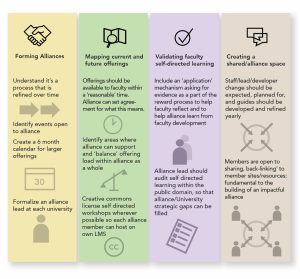Recommendations For Your Implementation
Recommendations for others Universities/Alliances
Based on the collective experience from project team discussions, implementation changes, and the desire to help you ‘future-proof’ your own implementation, we would like to provide you with a collection of recommendations.
Key recommendations that a project similar to our own should follow are;

The above infographic can be better informed with aid of the following detailed list of recommendations.
Suggested practices for forming alliances
- Taking the idea of a reward and recognition system to full fledged alliance is not a light switch, it’s a process,
- Events that are supported and shared help to build a richer set of offerings across all member institutions,
- Start small and build relationships across institutions to see what blossoms,
- Reach out to other universities to help you with problem solving or gap filling,
- Allow for concerns to ‘just sit there’ (eg. what if leadership changes?) during the formation process. These questions connect to discussions around the degree to which the alliance should be ‘formalized’, and these take time,
- Recognize the scope of each center, and the manner in which each can contribute, accepting various degrees of participation,
- Incorporate events/discussions/etc that build trust between centers,
- ‘Alliance Lead’ role should be formalized for each center, assuring that any staffing change/downsizing is planned for,
- Alliance Lead ‘tasks’ (maintaining space, reviewing applications, collaborating with other leads, etc) should also be the person to communicate shared events as a means of making efficient communication channels, and
- The ‘contributions’ of each member should be transparent, but will only be ‘on balance’ long term (eg. scheduling, speakers, marketing, platform supports, etc).
Suggested practices for mapping current and future offerings
- Where centers have persons employed with soft funding, do these people offer unique events? Determine, in a pathway, if it can continue to be offered (to assure the pathway is future-proof),
- All rewards placed in the system should be made available to faculty within a ‘reasonable’ time,
- ‘Reasonable’ time is flexible and so the alliance should agree on a set of strategies that can be put in place to allow faculty to ‘quickly’ participate in self directed offerings, or choose ‘down the road’ facilitated options,
- The alliance can support the offerings and ‘balance’ the offering load in some cases some of the time
- Future offerings not yet known need to have a ‘space’
- Auditing pathways each year for currency
- Topical/emerging pedagogies/strategies are not always accounted for in ‘big’ systems
- Creative commons license an offering wherever possible to share offerings across alliance members
- Record visiting scholars, gaining permission for ‘open sharing’
Suggested practices for validating faculty self-directed learning
- Inclusion of the ‘application’ mechanism within the Faculty Development passport that asks for evidence or reflection to occur as a part of the reward process
- ‘Alliance Lead’ audit of self directed (SD) learning, within the public domain, so that current/future gaps can be filled (maintaining validity)
L: authority to encourage faculty to participate in SD learning, and can direct toward the passport as a valid means of accomplishing SD learning that is valued - Leadership communications should promote development opportunities of all forms as they have a full faculty distribution list. This is currently a practice for formal learning offerings/events but must be expanded to include self directed learning that is embedded in the FD passport space
- Development of statement/agreement that can be shared with other academic leaders, that supports the validity of self directed forms of professional development
- Annual check ins of VP Teaching & Learning (or equivalent roles) within the alliance to assure support/value of development in all forms
Suggested practices for creating a shared/alliance space
- Staff/admin/developer change/downsizing needs to be expected with documentation/guides developed to make the system future-proof
- Alliance members are open to sharing. This is fundamental to the building of an impactful alliance. This benefits the passport space also in that it allows ‘back-linking’ to alliance member sites/resources/etc
- ‘Alliance lead’ role is most aware of the platform/space and is a ‘go to’ person for anyone who may have questions/issues arise
- Auditing process led by the ‘alliance leads’ to assure continuing offerings are represented in center yearly schedules, and new/trending

